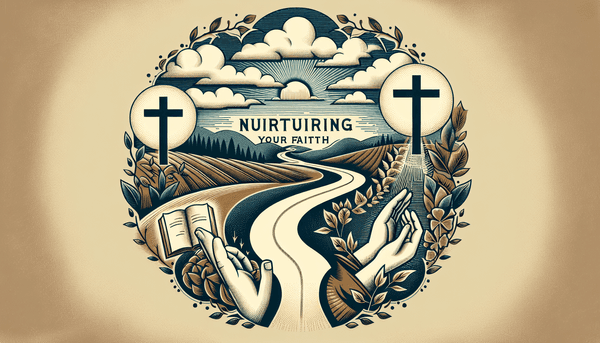Understanding Faith in the Christian Walk
At the heart of the Christian walk lies faith, a belief in the unseen and a trust in the divine. It is described in Hebrews 11:1 as 'the substance of things hoped for, the evidence of things not seen.' This faith is not passive; it requires action, a daily commitment to live by the principles taught by Jesus Christ, as we're reminded that 'the righteous shall live by faith' (Romans 1:17). Jesus Himself recognized and commended great faith during His earthly ministry, such as in the case of the centurion whose servant was healed because of his unwavering belief (Matthew 8:10). As followers of Christ, we are called to nurture this faith, allowing it to grow and mature, just as the Thessalonians did, whose faith grew abundantly (2 Thessalonians 1:3). Faith is not static; it is dynamic and must be cultivated through regular engagement with God's Word and through the transformative power of the Holy Spirit.
Trusting God in All Things
One of the purest forms of faith is trust—trust in God for all our concerns and needs. Proverbs 3:5-6 offers sage advice, urging us to 'Trust in the Lord with all your heart and lean not on your own understanding.' This trust goes beyond mere acknowledgment; it's a wholehearted reliance on God's sovereignty and goodness. When we submit to Him, He promises to make our paths straight. The psalmist echoes this sentiment, declaring, 'Commit your way to the Lord; trust in Him, and He will act' (Psalm 37:5). Trusting God yields peace, as stated in Isaiah 26:3, where those whose minds are steadfast because they trust in God will be kept in perfect peace. Drawing near to God is a practice that requires both intentionality and humility, as James 4:8 encourages us to draw near to Him, and in turn, He will draw near to us.
Strengthening Faith through Prayer
Prayer is the lifeline between the believer and the divine, a powerful means of communication that allows us to express our deepest thoughts, concerns, and desires to God. The Lord's Prayer, taught by Jesus as recorded in Matthew 6:9-13, provides a model for approaching God with reverence, submitting to His will, and seeking His provision and forgiveness. Effective prayer involves thanksgiving and the assurance that God hears us, as noted in Philippians 4:6 and 1 John 5:14. It is through consistent, fervent prayer that we maintain an open line of communication with God, as 1 Thessalonians 5:17 urges us to 'pray without ceasing.' Jesus emphasized the importance of persistence in prayer, encouraging believers to remain steadfast in their petitions before God (Luke 18:1). To further explore the transformative power of spiritual practices like prayer, consider reading about the sacred act of baptism and other deep themes of Christian belief.
The Role of Worship in Faith
Worship is our response to God's greatness, a way to honor and exalt Him for who He is and what He has done. When we worship, we bow down before our Creator, as urged in Psalm 95:6, and are called to do so in spirit and truth (John 4:24). Worship can take many forms, including music, scripture reading, and fellowship with other believers. Gathering together as a community of faith is vital, as Hebrews 10:25 reminds us not to neglect meeting together but to encourage one another in faith. Individually, we can also engage in worship through personal times of reflection and meditation, as the psalmist did during the night watches (Psalm 63:6). Music and scripture are powerful conduits of worship, enabling us to sing psalms, hymns, and spiritual songs from the heart (Ephesians 5:19) and to let the message of Christ dwell among us richly (Colossians 3:16).
Conclusion
As we conclude, it's important to reflect on the journey of faith as one that is ongoing, requiring dedication and an open heart to God's will. The practice of prayer and worship are not just rituals; they are vital acts of devotion that connect us to the heart of the Father and empower us to live out our faith. By consistently engaging in these spiritual disciplines, we align our hearts with God's purposes, nurturing a faith that is dynamic and alive. While the path may not always be easy, the rewards of a strengthened faith and a deeper connection with God are immeasurable. Let us, therefore, press on in our journey, trusting that as we draw near to God, He will draw near to us, guiding us every step of the way.






